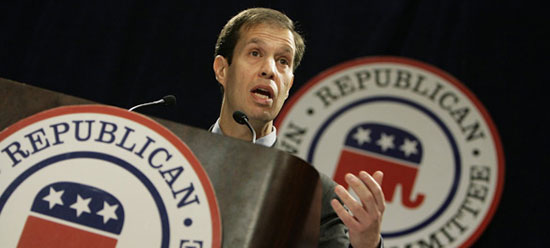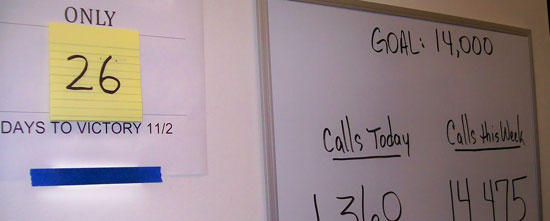Ken Mehlman: "Hope is Not a Strategy"
2010-11-10 12:46:00

Policy is shaped by the same demographic polling feedback cycles that shape campaigns. The sales pitch never stops in America. Barack Obama is a student of history and the past 30 years make it clear there's no other game in town. Like any thinking human, Obama is not happy with the world as he finds it.
His words: "Karl Rove can afford to win with 51 percent of the vote. They're not trying to reform healthcare. They are content with an electorate that is cynical about government. Progressives have a harder job. They need a big enough majority to initiate bold proposals." Of course, Obama's got ghostwriters and silent sponsors, too. Perception Managment and Opposition Research is the name of the game, and as presidential candidates transition towards being corporate spokesmodels, things will only get weirder from here.

It's been pretty bad for a very long time. How does a Bush regime even happen? I'm a big fan of mechanics and I have no patience for philosophy and theory. My thirst for answers with substance has primarily led me to sources like Karl Rove and his protege, Ken Mehlman. Bush critics have nothing to offer but their complaints, Bush insiders provide a more practical perspective. Running a political campaign is little different from any other high-level business venture.
The following is an edited transcript of an interview he delivered for PBS Frontline, focusing on the parts where he details the work of campaign management. His testimony is about a discipline that dominates modern politics: the art of running a two-term campaign. Clinton learned it from studying Reagan, but Bush II turned it into a simple science. Mehlman lays out the secret sauce in five words: "good policy is good politics."

Meet Ken Mehlman
Hope is not a strategy, and a lot of people who are in politics and business and elsewhere say, "We're doing this; we hope it works." Well, the question is, how do you know if it's working? I strongly believe in having benchmarks that you agree on up front that will tell you if it's working, and measuring those benchmarks on a regular basis. Our goal is to raise X; how much does that mean we need to raise per week to get there? How do we measure that per week, how do we measure it per city [and] how do we measure it per event so that we're not surprised when they find out we're not doing well or we are doing well?
So the 2004 campaign did that for everything. We did it for raised dollars; we did it for voter registration; we did it for number of visits we wanted to make to different places around the country; we did it for polling; we did it for number of people who wanted to book on television. I was the campaign manager; my job was to be the CEO of the campaign. Well, you're not going to be effective if you're micromanaging people. So how do you simultaneously take that job and also be sure that you know things are going along? My belief is, develop a plan. When you agree with the different people who are helping do this, one, how do you measure if a plan is successful? That's known as metrics.
We had made an unprecedented effort on behalf of grassroots in 2000, and we wanted to continue with that effort and to try to institutionalize that effort and improve that effort even more. Secondly, we looked at the electorate, and we said, "What does it take to get to 51 percent, and where do we need to improve?" And we made a methodical effort to try to improve among Latinos, among African Americans, among women, among the Jewish Americans, and state by state, to improve among those key groups. And there were other groups we needed to maintain our support among.
There was a very methodical effort over the last four years to say: "How do we grow the electorate in a way that is beneficial to the president? And how do we bring new folks into the cause, and how do we make sure that our political tactics are the most effective they can be?" We used the '01 and '02 elections to test those tactics for '04.

The press, unfortunately for them, believes that it's zero-sum, that it's either a base or a swing strategy. And the fact is, we appeal to both. As I said, from a base perspective, conservatives increased their participation level as a proportion of the electorate. Republicans were for the first time ever equal to Democrats in their participation level of the electorate. At the same time, 44 percent of the Latino vote, the highest ever. We improved our performance among people that live in big cities by 13 points, from 26 to 39 percent. African Americans go up, Jewish Americans go up, women go up. Across the political spectrum, we not only appealed to the red areas, making them redder, but we turned a lot of blue areas purple.
We raise a lot of money in the mail. But typically, the way a presidential campaign works is -- and certainly Republican campaigns -- in the beginning you'll raise more money in events and less money in the mail, and at the end, more money in the mail and less money in events, because your direct mail donors typically give when they hear a lot of news on politics.

My job as political director was to oversee that process for the White House and for the administration: Who do we travel to? Who do we help? Who do we raise money for? And what do we talk about when we go there? What advice do we give them? How can we help them in an appropriate way? All those were part of my mission. A lot of it's based on polling; a lot of it's based on the number of days that are available; a lot of it's based on the number of electoral votes in the state. We have a formula we allocate and move around and change. Sara Taylor was the person who was responsible for developing that formula and helping make sure that we kept on track on that formula.
The advantage of having a system that measures is, you don't worry. I never was laying awake at night worrying about the campaign. During the entire 18 months, I slept like a baby every single night because I had confidence in our plan and in our people and in our system. And that confidence was buoyed by the fact that I was getting information that confirmed things were going the right way. The same thing with voter registration; same thing with the number of presidential visits; same thing with everything we do. If you can't measure it, it's not worth doing, because then you know whether you're being successful. That's how you avoid hope being your strategy.
